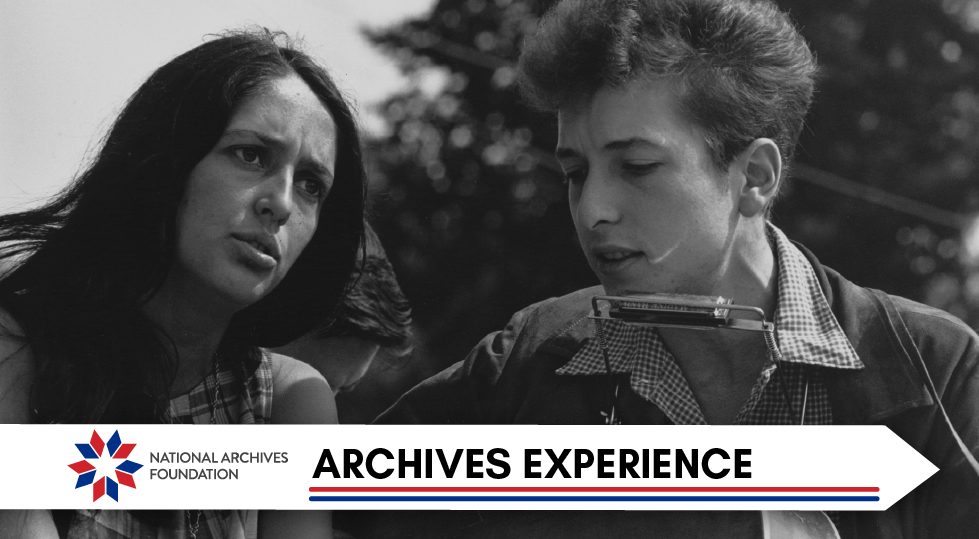Archives Experience Newsletter - March 21, 2023
A Protest Playlist
In 1993, the year the Foundation was established, the #1 song on the Billboard Year-End Hot 100 list was “I Will Always Love You” by Whitney Houston. How about the year you were born? Or (if applicable) your children, or even your grandchildren? For every generation or era in American history, there are distinctly different sounds, moods and messages.
If we took a bird’s-eye view of the chart-topping hits throughout our history, we’d probably get a pretty good handle on the pulse of the nation. But wherever there’s mainstream art, there’s also counterculture, and music is an especially strong medium through which to channel historic events that have led to grief, anger, and protest.
Join us this week as we explore records of the soundtrack of our history.
In this issue
| A | B |
|---|---|
| Track 1 Lift Every Voice and Sing – Artist: James and Rosamund Johnson |
Track 1 This Land Is Your Land – Artist: Woody Guthrie |
| Track 2 We Shall Overcome – Artist: Reverend Charles Albert Tindley, as sung by Charleston Cigar Factory Workers |
Track 2 Where Have All the Flowers Gone – Artist: Peter Seeger |
| Track 3 Strange Fruit – Artist: Billie Holiday |
Track 3 We Shall Overcome – Artist: as sung by Joan Baez |
| Track 4 What’s Going On – Artist: Marvin Gaye |
Track 4 Born in the U.S.A. – Artist: Bruce Springsteen |
| Track 5 Fight the Power – Artist: Public Enemy |
|
| Track 6 Glory – Artist: John Legend and Common |
Bonus Track
Side A
Black singers and songwriters have produced many protest songs over the past century. Black soul singers have been singing about the mistreatment of Black people by authority figures for years—“Joe Turner Blues,” a song about an evil white sheriff who wrongly incarcerated Black men that originated in the late 1800s is a case in point. This is a theme that continues to resonate in protest music to the present day.
Track 1
In 1901, in New York City, James Weldon Johnson, the Black American writer and civil rights activist, wrote a poem titled “Lift Every Voice and Sing” that his brother, J. Rosamund Johnson, set to music. The lyrics speak of the Exodus from slavery, the dark past Black people in America had experienced and the bright future they anticipated. The song spread like wildfire—within just a few years, people everywhere, but particularly in the South, were singing it. The National Association for the Advancement of Colored People (NAACP) adopted the song as the “Negro National Anthem” in 1919.
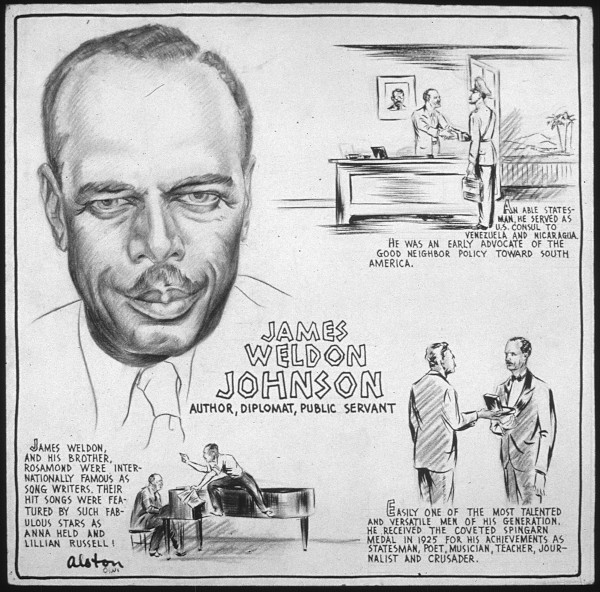
James Weldon Johnson – Author, Diplomat, Public Servant
National Archives Identifier: 535623 pg 3

James Weldon Johnson portrait
National Archives Identifier: 559201
Track 2
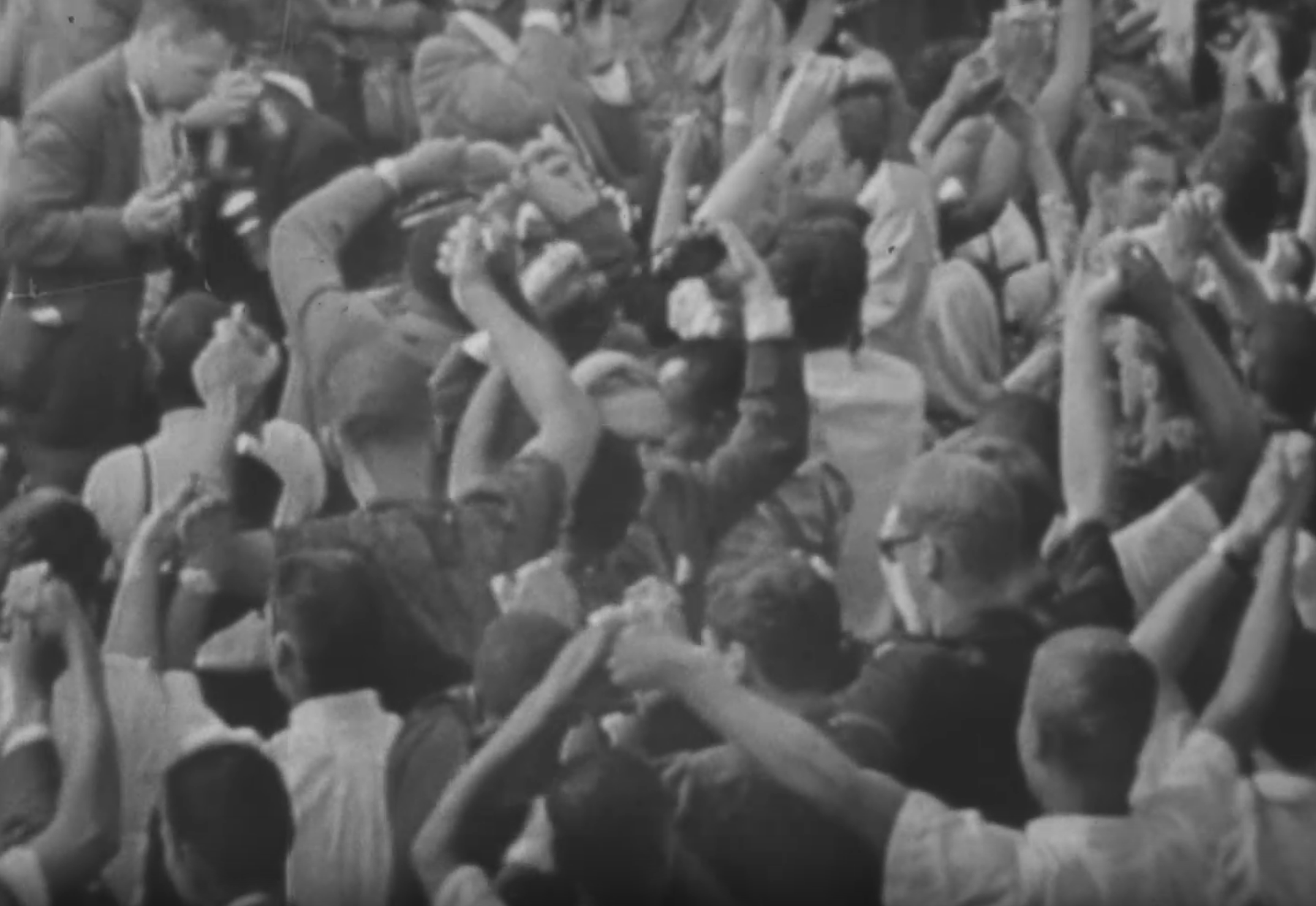
Marchers unite in song
Click to watch
The March on Washington
in the NARA Catalog
National Archives Identifier: 49737
The same year that the Johnson brothers composed their song, a gospel hymn by the Reverend Charles Albert Tindley of Philadelphia titled “I Shall Overcome Someday” was published. Tindley’s song is believed to be the lyrical ancestor of the famous protest song and civil rights anthem “We Shall Overcome.” The contemporary version of the song first rose to prominence when striking workers at the Charleston Cigar Factory in South Carolina sang “We Shall Overcome” on the picket line in 1945. The song was published in 1947 under the title “We Will Overcome” in the People’s Songs Bulletin, a publication of People’s Songs, an organization Pete Seeger directed.
Track 3
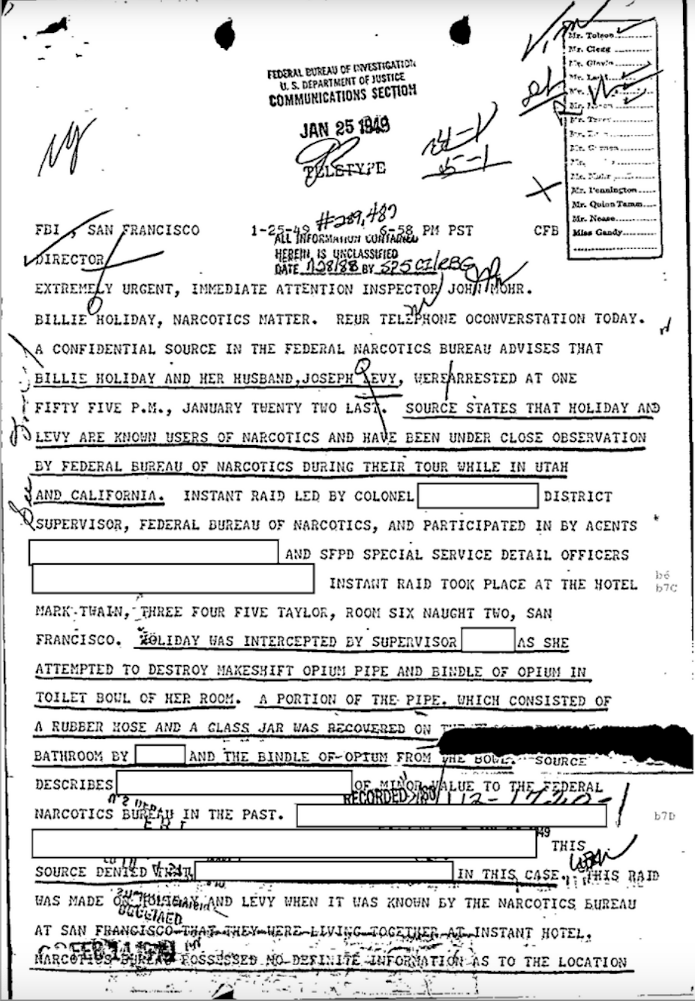
Billie Holiday arrest records
Source: FBI Archives
Billie Holiday’s 1939 recording of “Strange Fruit” graphically depicts lynched Black men hanging from trees. It was written by Abel Meeropol, a first-generation American born to Jewish Russian immigrants in the Bronx. Holiday performed it on a darkened stage with a single spotlight illuminating her figure. When she finished it, she left the stage in total darkness. It became a huge hit, but the U.S. government was incensed and proceeded to frame her for possession of heroin. They succeeded in getting Holiday sent to jail and stripping her of her cabaret license.
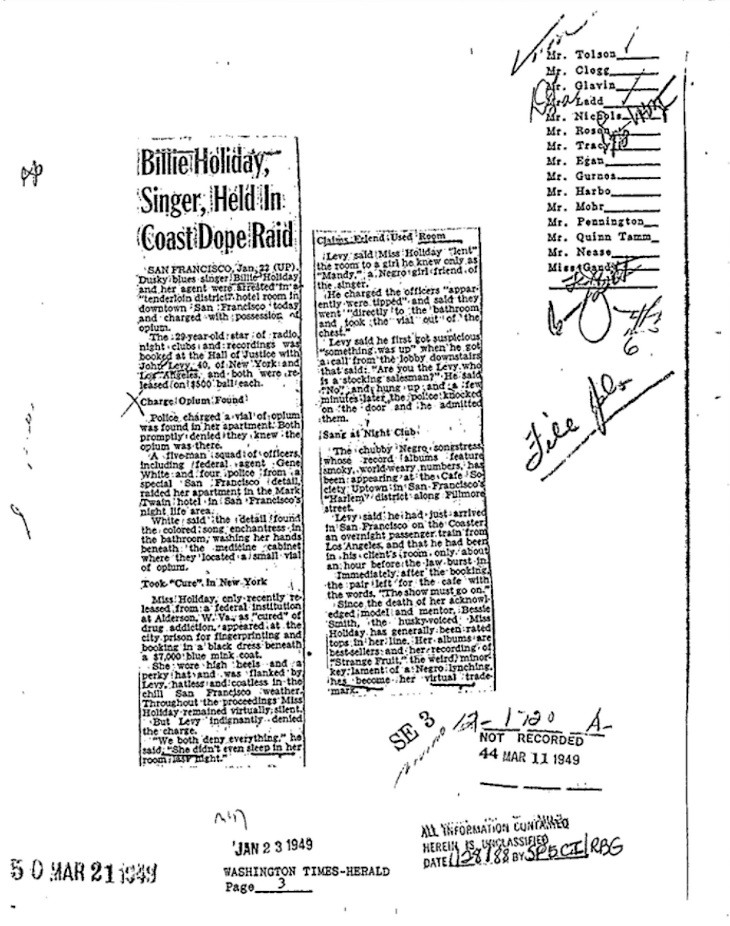
Billie Holiday arrest in the news
FBI Archives
Having heard Bob Dylan’s “Blowin’ in the Wind,” singer Sam Cooke felt ashamed that he had not addressed racial discrimination himself. He responded by writing “A Change Is Gonna Come” in 1964, a song that has since been adopted by the Civil Rights movement and many political campaigns.
Track 4
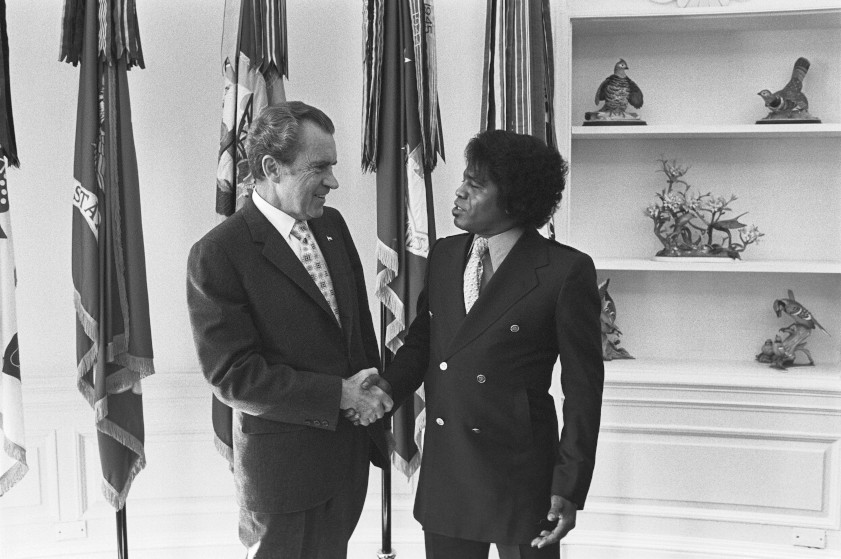
President Nixon and James Brown shake hands in the Oval Office, 1972
National Archives Identifier: 66394326
James Brown’s “Say It Loud” (1968) remains a defiant anthem of Black pride. Marvin Gaye, who was not considered a particularly political figure in the music industry at this time, recorded the seminal song “What’s Going On” in 1971, a tune that challenged police brutality and the escalation of the Vietnam War.
Track 5
In the 1970s, hip hop music originated in New York City as part of a larger cultural phenomenon. A subset of hip hop music, rap music, developed a protest element that aggressively denounced police violence, epitomized by recordings such as Public Enemy’s “Fight the Power” (1989).
Track 6

Click to watch
John Legend perform at the White House, 2012
Source: Obama White House Archives
One of the more recent protest songs is John Legend and Common’s “Glory” (2014), written for the motion picture “Selma,” which won the Academy Award for Best Song that year. The song features Legend playing the piano and singing, Common rapping and a choir providing back-up vocals.
Side B
Track 1
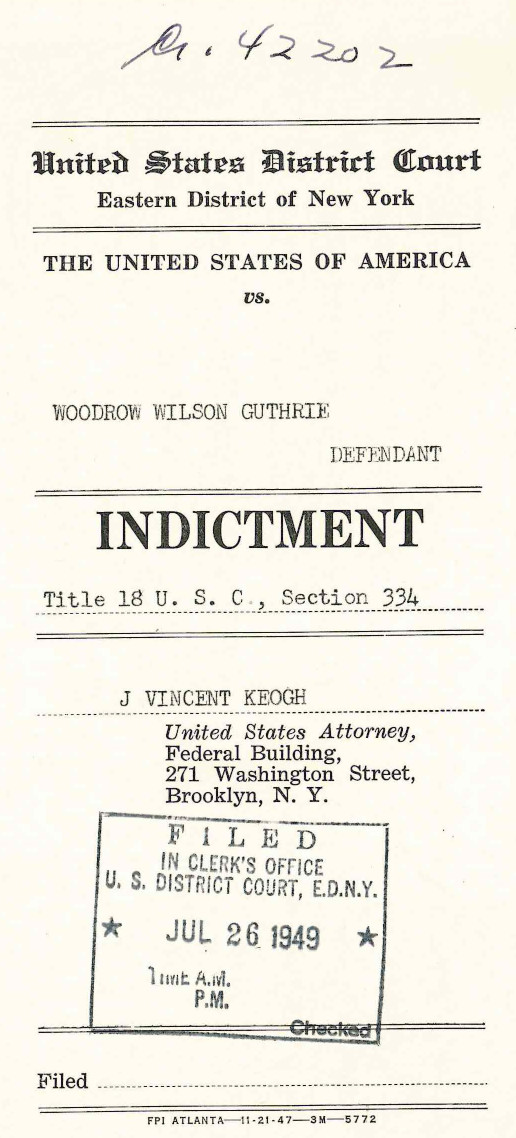
Woody Guthrie indictment
National Archives Identifier: 7570227
Woodrow Wilson Guthrie was one musician who made a career out of writing and performing protest songs. Born in 1912 and raised in Okemeh, Oklahoma, he married young, but when the Dust Bowl era began there, Guthrie left his wife and three kids and migrated to California looking for work. There he began playing his guitar and singing for money, made friends with prominent socialists and communists like Will Geer and John Steinbeck and set himself on the path that he followed for the rest of his life.
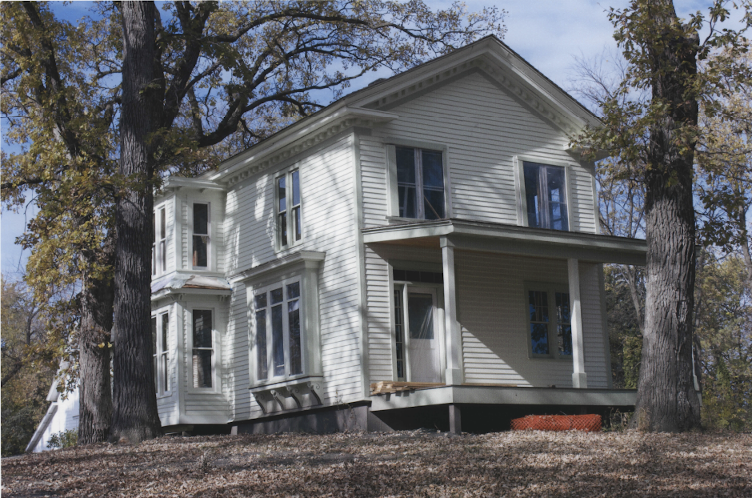
Woody Guthrie house, Oklahoma
National Archives Identifier: 137890955
Notable Guthrie protest compositions include “This Land Is Your Land,” which he wrote in response to Irving Berlin’s “God Bless America,” because he was tired of hearing it played on the radio continuously; “Deportees (Plane Wreck at Los Gatos),” composed after 28 migrant farm workers died in an airplane crash while they were being deported back to Mexico; and “Ludlow Massacre,” written about a mass killing of strikers by a militia in Ludlow, Colorado, in 1914.
Despite his close friendships with many members of the Communist Party, Guthrie was never a member. He often said, “I’m not a Communist, but I’ve been in the red all my life.” Still, there was no doubt about where he stood in political matters: his beat-up guitar bore a label that read, “This machine kills fascists.” Guthrie profoundly influenced many musicians who came after him, including Pete Seeger, Bob Dylan, Phil Ochs and Bruce Springsteen.
Track 2
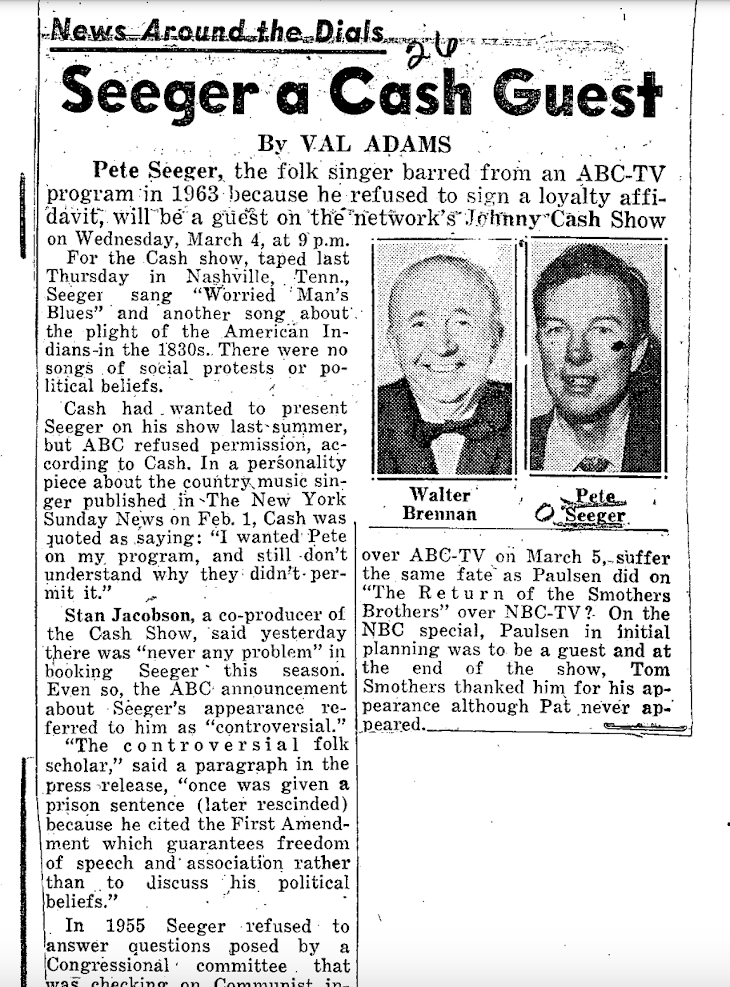
“Controversial” Pete Seeger to be a guest on Johnny Cash Show
Peter Seeger was an American folk singer whose music first hit the radio waves in the 1940s and was still popular throughout the early 1950s. An early devotee of Guthrie and the blues singer Huddie Ledbetter, known as “Lead Belly,” Seeger began to affiliate himself with civil rights, workers’ rights, international disarmament and environmental causes in the 1960s. He wrote “If I Had a Hammer” with Lee Hays, “Where Have All the Flowers Gone,” “Turn! Turn! Turn!” and “Waist Deep in the Big Muddy” and helped popularize “We Shall Overcome” as a protest anthem. His membership in the Communist Party cost him considerable commercial success, but Seeger never backed down from the causes he believed in. Dozens of artists have acknowledged his influence on their musical approach.
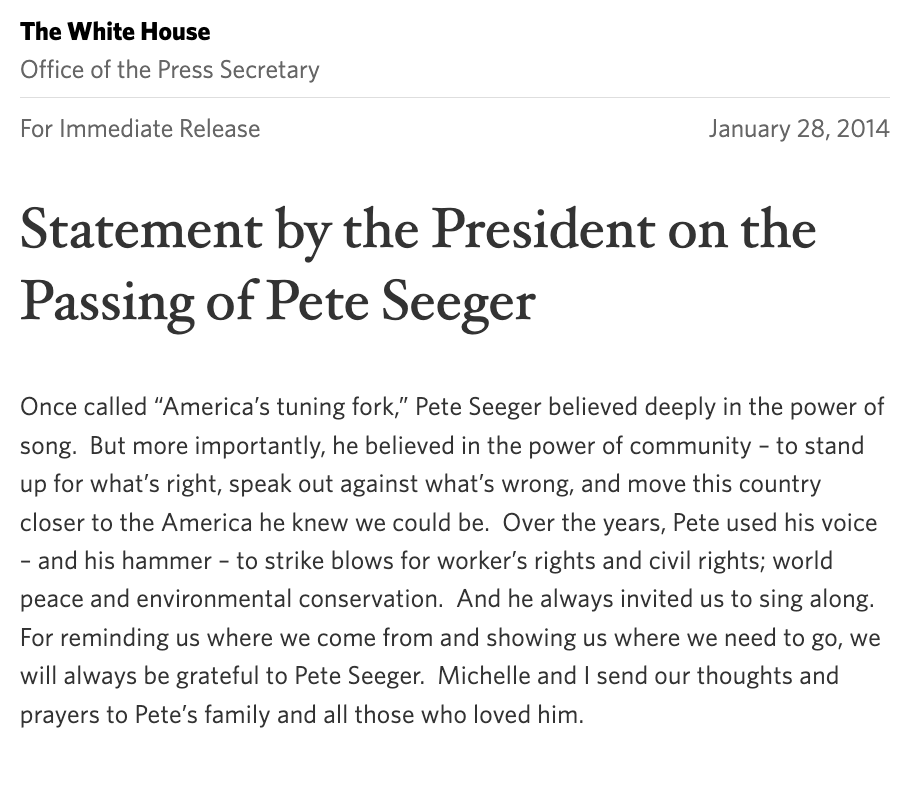
Obama statement on Pete Seeger passing
Source: Obama White House Archives
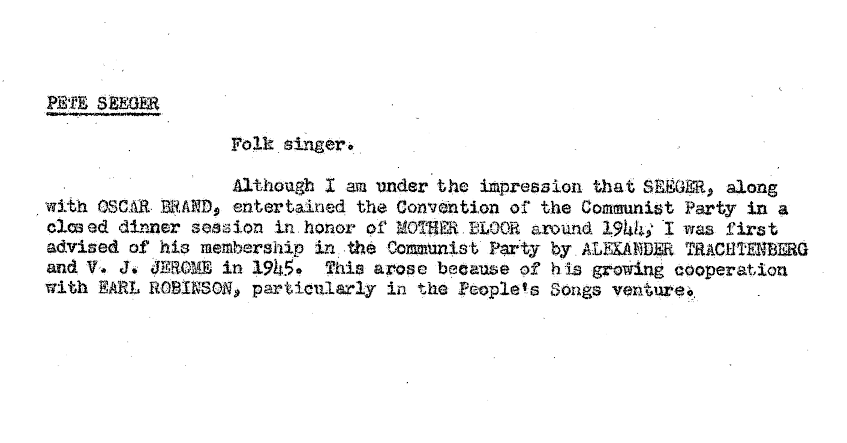
Digitized FBI Files under the Freedom of Information Act (FOIA) – Peter Seeger
Source: NARA Research – Special Access and FOIA
Track 3

Jimmy Carter and Joan Baez
National Archives Identifier: 842076

Jimmy Carter SALT briefing, Joan Baez
National Archives Identifier: 842077
A musician whom Pete Seeger influenced very early is Joan Baez, whose aunt took her to one of Seeger’s concerts when she was 13. Baez had learned to play the ukulele a few years prior, and she then began playing and singing Seeger’s songs, first at home and soon in public. From that point onward, Baez has aligned herself with activist causes, including the anti-Vietnam War movement; the Civil Rights movement; prison and death penalty reform; environmental causes; and LGBTQ rights. She has particularly affiliated herself with the song “We Shall Overcome,” which she sang at the 1963 March on Washington for Jobs and Freedom in Washington, D.C.

Joan Baez and Bob Dylan at the 1963 Civil Rights March
National Archives Identifier: 542021

Joan Baez with sign We Shall Overcome
National Archives Identifier: 542017
Joan Baez at the March on Washington
(20 minutes 37 seconds)
National Archives Identifier: 49737
Track 4
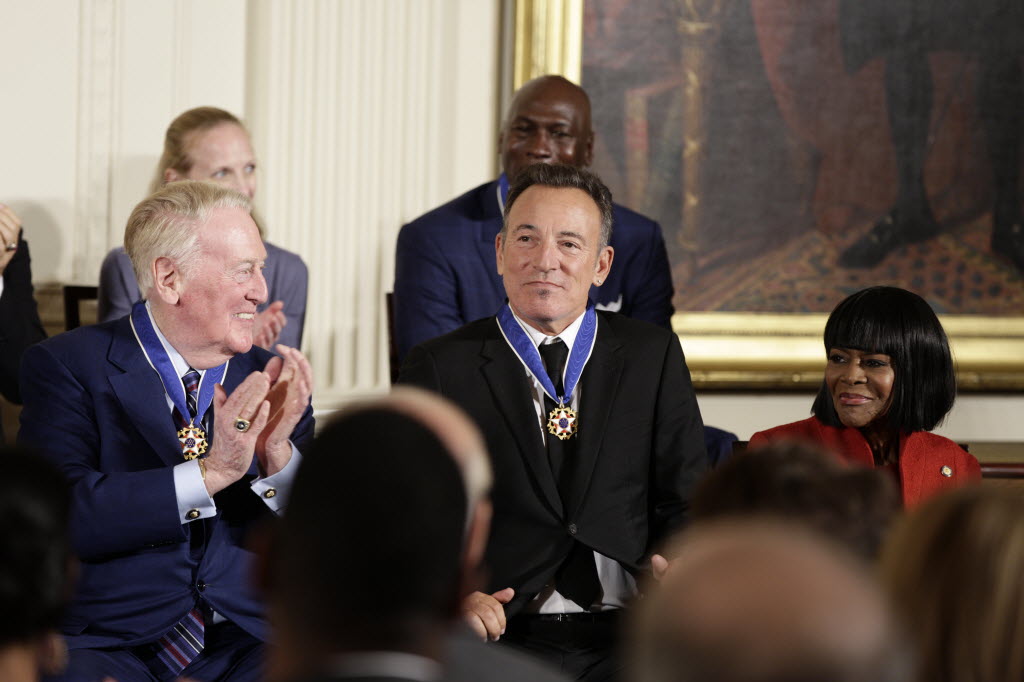
Medal of Freedom 2016
National Archives Identifier: 281106547

Bruce Springsteen and the Obamas
Source: Obama White House Archives
Perhaps the best-known artist currently working in the protest genre is Bruce Springsteen, who has been actively recording such songs as “Born in the U.S.A.,” “Johnny 99,” “The Ghost of Tom Joad,” “Seeds,” “Promised Land” and “My Hometown” for more than half a century. Springsteen has depicted the drying up of manufacturing jobs in the U.S., the plight of American veterans—especially Vietnam veterans—the difficulties of American blue-collar workers, the decline of Rust Belt towns, police brutality and the Black Lives Matter movement.
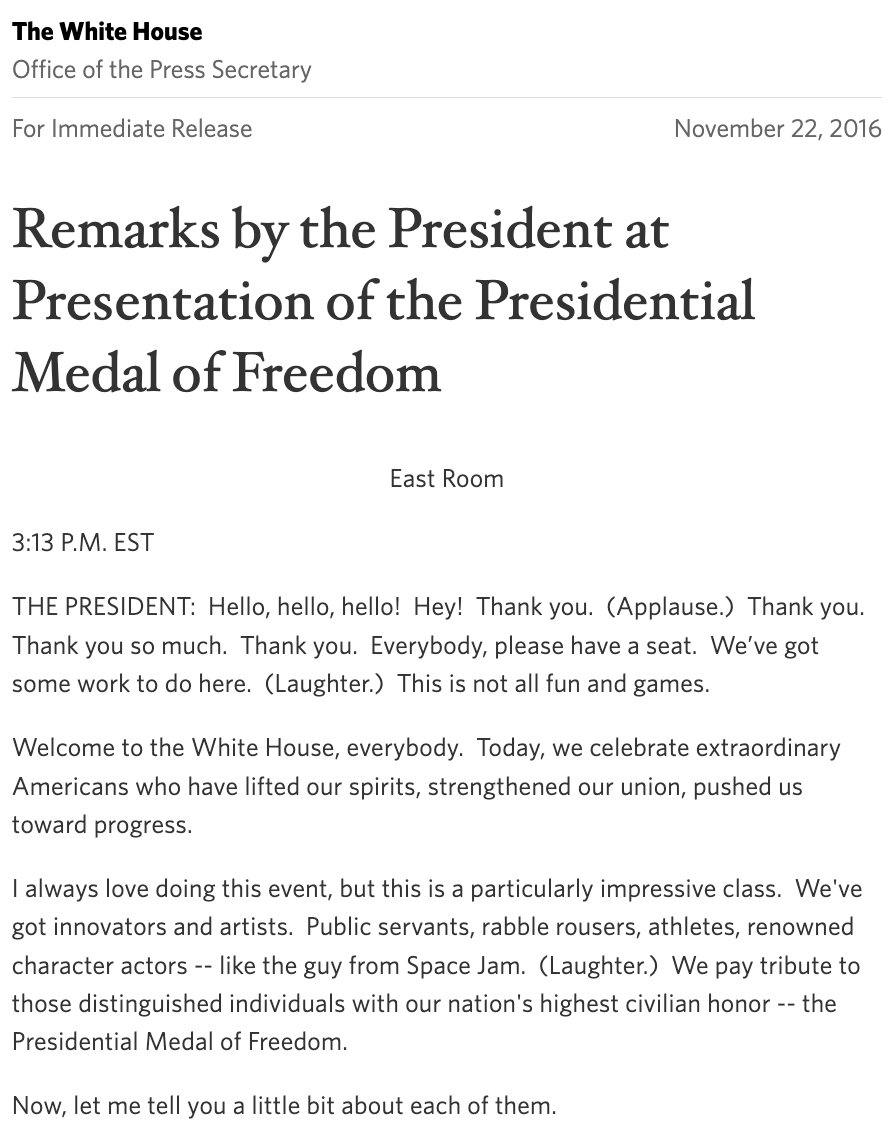
Obama remarks on Bruce Springsteen
Source: Obama White House Archives





